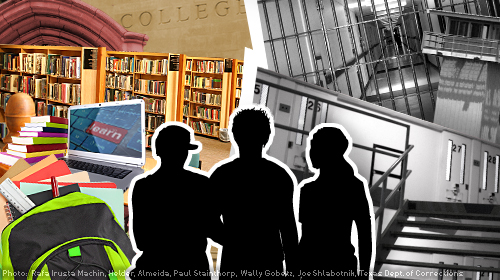
A couple years ago, a high school student in Philadelphia named Kevin was caught with a small pair of scissors in his backpack while going through the school's metal detector. He had forgotten to remove it after wrapping Christmas presents at his girlfriend's house the night before. Kevin was arrested, suspended, and transferred to a disciplinary school.
Unfortunately, Kevin's story is one of many. American children nationwide, especially youth of color, are pushed off the track of careers and college and onto a path to prison by overly harsh punishments in school.
Funneling kids like Kevin into the criminal justice system wastes the future and potential of our youth. A child's delinquent behavior—especially that which can be addressed through other, less damaging means—should not be criminalized.
In recent months, Congress examined the blight of the mass incarceration and over-criminalization it helped to create through an expansion of laws and extending sentencing lengths in the 1980s. The ACLU is fighting to ensure children are not left out from Congress' solution to our prison crisis by advocating for intervention and prevention legislation like the Youth PROMISE Act.
My colleague, ACLU legislative counsel Jennifer Bellamy spoke at a panel at Georgetown Law Center on over-criminalization yesterday, along with Paul Larkin from the Heritage Foundation and Georgetown Law Professor Julie O'Sullivan. She spoke about the disturbing trend of criminalizing student behavior.
"Children are being arrested and herded into juvenile detention centers and the revolving doors of the criminal justice system like never before," Bellamy said.
Pressed by high-stakes testing, an uptick in high-profile incidents of school violence, and a lack of resources, schools are forgoing mentoring and effective interventions for students in favor of the drastic steps of expulsions and exclusions, which often have irreversible consequences. School disciplinary measures are at an all-time high—three times the rate in the 1970s—and yet violence in schools continues to rise as test scores fall.
"Because of shrinking school budgets and limited resources, law enforcement officers in schools have become de facto disciplinarians taking on roles that they aren't trained for," added Bellamy.
"If all you have is a hammer, everything looks like a nail. Law enforcement officers will handle a disturbance in the way they are trained to do with arrest."
Although a well-intentioned effort to keep students and teachers safe and able to learn without distraction, the presence of law enforcement officials in schools harms academic achievement for all students while increasing the chances that students will be held back, drop out, and become involved with the juvenile and criminal justice systems.
While it's great news that Congress is seeking to address the problem of over-criminalization with a focus on undue sentencing and burdensome regulations, it must address where the majority of adult offenders begin: juvenile detention centers. It's time we restore every school's role as a sanctuary of learning.
Learn more about the school-to-prison pipeline and other civil liberty issues: Sign up for breaking news alerts, follow us on Twitter, and like us on Facebook.


